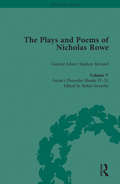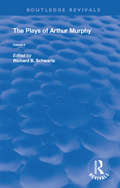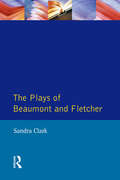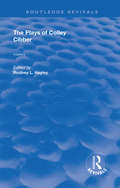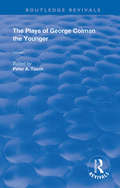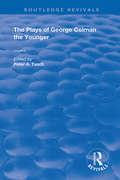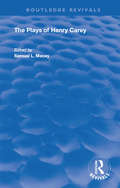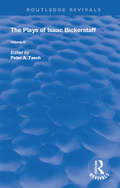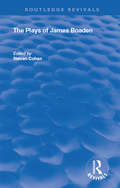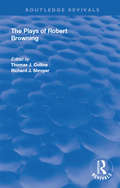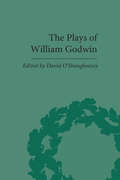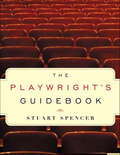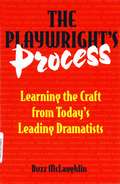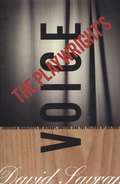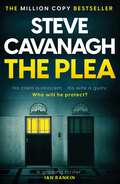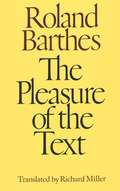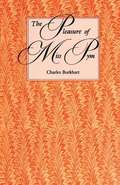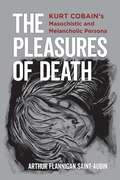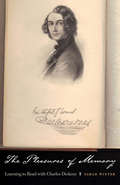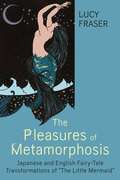- Table View
- List View
The Plays and Poems of Nicholas Rowe, Volume V: Lucan’s Pharsalia (Books IV-X) (The Pickering Masters)
by Lucan’s PharsaliaNicholas Rowe was the first Poet Laureate of the Georgian era. A fascinating and important yet largely overlooked figure in eighteenth-century literature, he is the ‘lost Augustan’. His plays are important both for the way they address the political and social concerns of the day and for reflecting a period in which the theatre was in crisis. This edition sets out to demonstrate Rowe’s mastery of the early eighteenth century theatre, especially his providing significant roles for women, and examines the political and historical stances of his plays. It also highlights his work as a translator, which was both innovative and deeply in tune with current practices as exemplified by John Dryden and Alexander Pope. This is the first scholarly edition of all Rowe’s plays and poems and is accompanied by 15 musical scores and 31 black and white illustrations. In this final volume the second part of his translation of Lucan’s Pharsalia, described by Samuel Johnson as one of the greatest productions in English poetry, is presented along with some his own original poetry. A newly written explanatory introduction to the Pharsalia by Stephen Bernard precedes the full edited text in volume IV. Appendices covering the related music and textual apparatus are also included. The edition comes with a consolidated bibliography for ease of reference.
The Plays of Arthur Murphy: Volume II (Routledge Revivals)
by Richard B. SchwartzOriginally compiled and published in 1979, this volume contains six plays of Arthur Murphy: The Apprentice; The Upholsterer; The Old Maid; The Citizen; No One's Enemy but His Own; Three Weeks After Marriage.
The Plays of Beaumont and Fletcher
by Sandra ClarkThis is an analysis of sexual themes in the plays of Beaumont and Fletcher, both in the context of the Jacobean theatre and in the light of modern readings of sexuality and gender during the English Renaissance. Sandra Clark challenges commonly-held perceptions of Beaumont and Fletcher's work. The book is intended for undergraduate and graduate courses on Renaissance literature, Elizabethan and Jacobean drama, tragicomedy, gender and genre in the Renaissance.
The Plays of Colley Cibber: Volume II (Routledge Revivals)
by Rodney L. HayleyOriginally collated and published in 1980, this volume contains the plays of Colley Cibber, edited and with an introduction by Rodney L. Hayley. The book contains The Lady's Last Stake, The Rival Fools, Ximena, The Non-Juror and The Refusal.
The Plays of Eugene O'Neill: A New Assessment
by Virginia FloydVirginia Floyd draws on her extensive knowledge of the playwright Eugene O'Neill's work and of his notebooks at Yale University to examine the composition and significance of all the plays, including those unpublished. In chronological order she deals with the significance of each play, assessing its autobiographical as well as literary aspects.
The Plays of George Colman the Younger: Volume 1 (Routledge Revivals)
by George ColmanOriginally composed and published in 1981, this second book makes up two volumes of the plays of George Colman the Younger. Versatile, industrious, talented, Goerge Colman the Younger (1762-1836) followed Sheridan as England's most popular playwright. He wrote not only monologues, farces, pantomimes, comic operas, and straight comedies, but also hybrid three-act anticipations of melodrama.
The Plays of George Colman the Younger: Volume 2 (Routledge Revivals)
by George ColmanOriginally composed and published in 1981, this second book makes up two volumes of the plays of George Colman the Younger. Versatile, industrious, talented, George Colman the Younger (1762-1836) followed Sheridan as England's most popular playwright. He wrote not only monologues, farces, pantomimes, comic operas, and straight comedies, but also hybrid three-act anticipations of melodrama.
The Plays of Henry Carey (Routledge Revivals)
by Samuel L. MaceyOriginally written between the years 1722 and 1743, the works of Henry Carey included in this volume were originally compiled by Samuel L. Macey for this volume in 1980. The volume includes the dramatic works of Henry Carey, Hanging and Marriage; or the Dead-Man's Wedding, and the songs, as they are sung in "Betty, or the Country-Bumpkins". They are all included here edited and with an introduction by Samuel L. Macey, as well as alongside textual notes.
The Plays of Isaac Bickerstaff: Volume III (Routledge Revivals)
by Peter A. TaschThis compilation of Isaac Bickerstaff's plays was originally compiled and published in 1981, and the plays written in the 1760s-70s. Edited and with an introduction by Peter A. Tasch, the volume contains seven plays: The Captive; He Wou'd if He Cou'd; or, An Old Fool worse than Any; The Recruiting Serjeant; 'Tis Well it's no Worse; The Brickdust-Man and Milk-Maid; The Sultan, or A Peep into the Seraglio; and The Spoil'd Child.
The Plays of James Boaden (Routledge Revivals)
by Steven CohanOriginally compiled and published in 1980, this volume contains the plays of James Broaden. Although not many critics of eighteenth-century drama mention Broaden, he loved the theatre and its world, and this love comes across in everything he wrote. This volume contains plays including the songs and chorusses of his first, Ozmynn and Daraxa, from 1793, Fountainville Forest, from 1794, and The Secret Tribunal, from 1795, as well as many others.
The Plays of Robert Browning (Routledge Revivals #No. 14)
by Thomas J. Collins Richard J. ShroyerPublished in 1988, and including all seven of Robert Browning’s dramas, Collins and Shroyer introduce this convenient and reliable reading text by discussing the plays with a history of criticism and giving insightful notes on each individual play in the book.
The Plays of William Godwin (The Pickering Masters)
by David O'ShaughnessyBest known for "Enquiry Concerning Political Justice" (1793) and "Caleb Williams" (1794), William Godwin (1756-1836) is one of the most important figures of the Romantic period. This book offers academics the chance to build a complete picture of Godwin as a writer and political figure.
The Playwright's Guidebook: An Insightful Primer On The Art Of Dramatic Writing
by Stuart SpencerA concise guide to playwriting to awaken creativity, from a playwright who has taught the subject for over a decade.“If you want to be a playwright, here’s your bible.” —David Lindsay-Abaire, author of Fuddy Meers and Wonder of the WorldDuring the more than ten years that Sturt Spencer has taught playwriting, he has struggled to find an effective handbook for his courses. Although most of the currently popular guides contain useful ideas, they all suffer from the same problems: poor organizations; quirky, idiosyncratic advice; and abstract theorizing on the nature of art. As a result, they fail to offer any concrete information or useful guidelines on how to construct a well-written play. Moreover, few of these books are actually written by working playwrights. Out of frustration, Spencer wrote his own. The result, The Playwright’s Guidebook, is a concise and engaging handbook full of the kind of wisdom that comes naturally with experience. Spencer presents a coherent way of thinking about playwriting that addresses the important principles of structure, includes insightful writing exercises that build upon one another, explores the creative process, and troubleshoots recurrent problems that playwrights actually face.“The Playwright’s Guidebook is indispensable. Clearly and thoroughly, Mr. Spencer—a playwright himself—leads all playwrights (not only the beginner) through the travails of creation and the jungle of production.” —Edward Albee“Eureka! A clearly written, well-structured, intelligent how-to book about playwriting. Like the good teacher and good writer that he is, Stuart Spencer guides rather than browbeats. Should be next to the laptop of any aspiring, or working, playwright.” —Warren Leight, author of Side Man
The Playwright's Process: Learning the Craft from Today's Leading Dramatists
by Buzz MclaughlinThis guide aims to teach the reader the craft of writing and producing stage drama. The book covers such topics as script format, arranging readings, contacting agents, and getting a full production. How to build a good plot, and producing a piece that will work on stage are also examined.
The Playwright's Voice
by David SavranThis new volume of interviews with contemporary playwrights attests to the fact the dramatic art is alive and well in America and celebrates the art and talent of fifteen of the theatre's most important artists. In extensive interviews, they discuss their work, influences and their craft and how the art form relates to our cultural heritage, as well as the state of theatre-its-meaning and purposes as we approach the 21st Century. David Savran lays out their remarkable achievements and provides telling insights to their work in his substantial introductions to each interview.Interviews with: Edward AlbeeJon Robin BaitzPhilip Kan GotandaHolly HughesTony KushnerTerrence McNallySuzan-Lori ParksJosé RiveraNtozake ShangeNicky SilverAnna Deavere SmithPaula VogelWendy WassersteinMac Wellman and George C. Wolfe.
The Plea: His client is innocent. His wife is guilty. (Eddie Flynn Series)
by Steve CavanaghFraud. Blackmail. Murder. It's all in a day's work for Eddie Flynn.For years, major New York law firm Harland & Sinton has operated a massive global fraud. The FBI are on to them, but they need witnesses to secure their case. When a major client of the firm, David Child, is arrested for murder, the FBI ask con-artist-turned-lawyer Eddie Flynn to secure Child as his client and force him to testify against the firm.Eddie's not a man to be forced into representing a guilty client, but the FBI have incriminating files on Eddie's wife, Christine, and if Eddie won't play ball, she'll pay the price.When Eddie meets David Child he knows Child is innocent, despite the overwhelming evidence against him. With the FBI putting pressure on him to secure the plea, Eddie must find a way to prove Child's innocence while keeping his wife out of danger - not just from the FBI, but from the firm itself.(p) 2016 Isis Publishing Ltd
The Plea: His client is innocent. His wife is guilty. (Eddie Flynn Series)
by Steve CavanaghYour client is innocent. Your wife is guilty.Who would you fight for?*'Quite simply, THE PLEA is one of the most purely entertaining books you'll read this year' John Connolly'A gripping thriller' Ian Rankin*When David Child, a major client of a corrupt New York law firm, is arrested for murder, the FBI ask con artist-turned-lawyer Eddie Flynn to persuade him to testify against the firm.Eddie is not someone who is easily coerced, but when the FBI reveal that they have incriminating files on his wife, he knows he has no choice.But Eddie is convinced the man is innocent, despite overwhelming evidence to the contrary. With the FBI putting pressure on him to secure the deal, Eddie must find a way to prove his client's innocence.But the stakes are high - his wife is in danger. And not just from the FBI . . .*Praise for race-against-time legal thriller writer, Steve Cavanagh:'A fantastic thriller writer' Mark Billingham'Cavanagh stands head and shoulders above the competition, with his skilfully plotted, action-packed and big-hearted Eddie Flynn novels . . . highly intelligent, twist-laden and absolutely unputdownable' Eva Dolan, author of the critically acclaimed Tell No Tales'What a thriller! Breathlessly brilliant and fiendishly clever' Miranda Dickinson'A cleverly constructed legal thriller combined with a classic locked-room mystery. Eddie Flynn is fast becoming one of my favourite fictional heroes and Cavanagh one of my favourite thriller writers.' S.J.I. Holliday, author of Black Wood'Raymond Chandler could have created Eddie Flynn. THE PLEA is Phillip Marlowe and Michael Connolly's Mickey Haller combined, with a bit of Jim Thompson's THE GRIFTERS thrown in. A superb read with a main character destined to be one of the most talked about in crime fiction.' Howard Linskey, author of The Search*If you like John Grisham, Lee Child and Michael Connelly, you will LOVE the gripping and twisty Eddie Flynn series:1. The Defence2. The Plea3. The Liar4. Thirteen* Each Eddie Flynn thriller can be read as a standalone or in series order *
The Plea: His client is innocent. His wife is guilty. (Eddie Flynn Series)
by Steve CavanaghYour client is innocent. Your wife is guilty.Who would you fight for?*'Quite simply, THE PLEA is one of the most purely entertaining books you'll read this year' John Connolly'A gripping thriller' Ian Rankin*When David Child, a major client of a corrupt New York law firm, is arrested for murder, the FBI ask con artist-turned-lawyer Eddie Flynn to persuade him to testify against the firm.Eddie is not someone who is easily coerced, but when the FBI reveal that they have incriminating files on his wife, he knows he has no choice.But Eddie is convinced the man is innocent, despite overwhelming evidence to the contrary. With the FBI putting pressure on him to secure the deal, Eddie must find a way to prove his client's innocence.But the stakes are high - his wife is in danger. And not just from the FBI . . .*Praise for race-against-time legal thriller writer, Steve Cavanagh:'A fantastic thriller writer' Mark Billingham'Cavanagh stands head and shoulders above the competition, with his skilfully plotted, action-packed and big-hearted Eddie Flynn novels . . . highly intelligent, twist-laden and absolutely unputdownable' Eva Dolan, author of the critically acclaimed Tell No Tales'What a thriller! Breathlessly brilliant and fiendishly clever' Miranda Dickinson'A cleverly constructed legal thriller combined with a classic locked-room mystery. Eddie Flynn is fast becoming one of my favourite fictional heroes and Cavanagh one of my favourite thriller writers.' S.J.I. Holliday, author of Black Wood'Raymond Chandler could have created Eddie Flynn. THE PLEA is Phillip Marlowe and Michael Connolly's Mickey Haller combined, with a bit of Jim Thompson's THE GRIFTERS thrown in. A superb read with a main character destined to be one of the most talked about in crime fiction.' Howard Linskey, author of The Search*If you like John Grisham, Lee Child and Michael Connelly, you will LOVE the gripping and twisty Eddie Flynn series:1. The Defence2. The Plea3. The Liar4. Thirteen* Each Eddie Flynn thriller can be read as a standalone or in series order *
The Pleasant Nights - Volume 1
by Don BeecherRenowned today for his contribution to the rise of the modern European fairy tale, Giovan Francesco Straparola (c. 1480-c. 1557) is particularly known for his dazzling anthology The Pleasant Nights. Originally published in Venice in 1550 and 1553, this collection features seventy-three folk stories, fables, jests, and pseudo-histories, including nine tales we might now designate for 'mature readers' and seventeen proto-fairy tales. Nearly all of these stories, including classics such as 'Puss in Boots,' made their first ever appearance in this collection; together, the tales comprise one of the most varied and engaging Renaissance miscellanies ever produced. Its appeal sustained it through twenty-six editions in the first sixty years.This full critical edition of The Pleasant Nights presents these stories in English for the first time in over a century. The text takes its inspiration from the celebrated Waters translation, which is entirely revised here to render it both more faithful to the original and more sparkishly idiomatic than ever before. The stories are accompanied by a rich sampling of illustrations, including originals from nineteenth-century English and French versions of the text.As a comprehensive critical and historical edition, these volumes contain far more information on the stories than can be found in any existing studies, literary histories, or Italian editions of the work. Donald Beecher provides a lengthy introduction discussing Straparola as an author, the nature of fairy tales and their passage through oral culture, and how this phenomenon provides a new reservoir of stories for literary adaptation. Moreover, the stories all feature extensive commentaries analysing not only their themes but also their fascinating provenances, drawing on thousands of analogue tales going back to ancient Sanskrit, Persian, and Arabic stories.Immensely entertaining and readable, The Pleasant Nights will appeal to anyone interested in fairy tales, ancient stories, and folk creations. Such readers will also enjoy Beecher's academically solid and erudite commentaries, which unfold in a manner as light and amusing as the stories themselves.
The Pleasant Nights - Volume 2
by Don BeecherRenowned today for his contribution to the rise of the modern European fairy tale, Giovan Francesco Straparola (c. 1480-c. 1557) is particularly known for his dazzling anthology The Pleasant Nights. Originally published in Venice in 1550 and 1553, this collection features seventy-three folk stories, fables, jests, and pseudo-histories, including nine tales we might now designate for 'mature readers' and seventeen proto-fairy tales. Nearly all of these stories, including classics such as 'Puss in Boots,' made their first ever appearance in this collection; together, the tales comprise one of the most varied and engaging Renaissance miscellanies ever produced. Its appeal sustained it through twenty-six editions in the first sixty years.This full critical edition of The Pleasant Nights presents these stories in English for the first time in over a century. The text takes its inspiration from the celebrated Waters translation, which is entirely revised here to render it both more faithful to the original and more sparkishly idiomatic than ever before. The stories are accompanied by a rich sampling of illustrations, including originals from nineteenth-century English and French versions of the text.As a comprehensive critical and historical edition, these volumes contain far more information on the stories than can be found in any existing studies, literary histories, or Italian editions of the work. Donald Beecher provides a lengthy introduction discussing Straparola as an author, the nature of fairy tales and their passage through oral culture, and how this phenomenon provides a new reservoir of stories for literary adaptation. Moreover, the stories all feature extensive commentaries analysing not only their themes but also their fascinating provenances, drawing on thousands of analogue tales going back to ancient Sanskrit, Persian, and Arabic stories.Immensely entertaining and readable, The Pleasant Nights will appeal to anyone interested in fairy tales, ancient stories, and folk creations. Such readers will also enjoy Beecher's academically solid and erudite commentaries, which unfold in a manner as light and amusing as the stories themselves.
The Pleasure Of The Text
by Roland Barthes Richard MillerWhat is it that we do when we enjoy a text? What is the pleasure of reading? The French critic and theorist Roland Barthes's answers to these questions constitute "perhaps for the first time in the history of criticism . . . not only a poetics of reading . . . but a much more difficult achievement, an erotics of reading . . . . Like filings which gather to form a figure in a magnetic field, the parts and pieces here do come together, determined to affirm the pleasure we must take in our reading as against the indifference of (mere) knowledge. " --Richard Howard
The Pleasure of Miss Pym
by Charles BurkhartWhen British writers Philip Larkin and Lord David Cecil named Barbara Pym one of the twentieth century's most underrated authors in a 1977 Times Literary Supplement survey, they started a Barbara Pym revival that continued unabated in Great Britain and the United States. Barbara Pym's delightful tales of jumble sales and parish meetings, her ironic insights into the relationships between women and men, have won a devoted following. Indeed she is often compared to that most accomplished author of comedies of manners, Jane Austen. The Pleasure of Miss Pym is a critical study of Pym as comic writer and of the links between her life and autobiographical writings and her fiction, written with a liveliness of style and tone that matches Pym's own. Not only does Charles Burkhart provide perceptive discussions of Pym's life and novels, he also illuminates the worldview represented in her work, the unique nature of her comedy, her religion, her place within the history of the novel, and her penetrating insights into male-female relationships. All of Pym's work, including the 1986 posthumous publication, An Academic Question, is intelligently surveyed here. Scholars of contemporary English literature will derive both instruction and pleasure from this elegantly written study, as will Pym's admiring readers, for whom it is also intended. When British writers Philip Larkin and Lord David Cecil named Barbara Pym one of the twentieth century's most underrated authors in a 1977 Times Literary Supplement survey, they started a Barbara Pym revival that continued unabated in Great Britain and the United States. Barbara Pym's delightful tales of jumble sales and parish meetings, her ironic insights into the relationships between women and men, have won a devoted following. Indeed she is often compared to that most accomplished author of comedies of manners, Jane Austen. The Pleasure of Miss Pym is a critical study of Pym as comic writer and of the links between her life and autobiographical writings and her fiction, written with a liveliness of style and tone that matches Pym's own. Not only does Charles Burkhart provide perceptive discussions of Pym's life and novels, he also illuminates the worldview represented in her work, the unique nature of her comedy, her religion, her place within the history of the novel, and her penetrating insights into male-female relationships. All of Pym's work, including the 1986 posthumous publication, An Academic Question, is intelligently surveyed here. Scholars of contemporary English literature will derive both instruction and pleasure from this elegantly written study, as will Pym's admiring readers, for whom it is also intended.
The Pleasures of Death: Kurt Cobain’s Masochistic and Melancholic Persona
by Arthur Flannigan Saint-AubinThe year 2019 marked the twenty-fifth anniversary of the death of Kurt Cobain, an artist whose music, words, and images continue to move millions of fans worldwide. As the first academic study that provides a literary analysis of Cobain’s creative writings, Arthur Flannigan Saint-Aubin’s The Pleasures of Death: Kurt Cobain’s Masochistic and Melancholic Persona approaches the journals and songs crafted by Nirvana’s iconic front man from the perspective of cultural theory and psychoanalytic aesthetics.Drawing on critiques and reformulations of psychoanalytic theory by feminist, queer, and antiracist scholars, Saint-Aubin considers the literary means by which Cobain creates the persona of a young, white, heterosexual man who expresses masochistic and melancholic behaviors. On the one hand, this individual welcomes pain and humiliation as atonement for unpardonable sins; on the other, he experiences a profound sense of loss and grief, seeking death as the ultimate act of pleasure. The first-person narrators and characters that populate Cobain’s texts underscore the political and aesthetic repercussions of his art. Cobain’s distinctive version of grunge, understood as a subculture, a literary genre, and a cultural practice, represents a specific performance of race and gender, one that facilitates an understanding of the self as part of a larger social order. Saint-Aubin approaches Cobain’s writings independently of the artist’s biography, positioning these texts within the tradition of postmodern representations of masculinity in twentieth-century American fiction, while also suggesting connections to European Romantic traditions from the nineteenth century that postulate a relation between melancholy (or depression) and creativity. In turn, through Saint-Aubin’s elegant analysis, Cobain’s creative writings illuminate contradictions and inconsistencies within psychoanalytic theory itself concerning the intersection of masculinity, masochism, melancholy, and the death drive.By foregrounding Cobain’s ability to challenge coextensive links between gender, sexuality, and race, The Pleasures of Death reveals how the cultural politics and aesthetics of this tragic icon’s works align with feminist strategies, invite queer readings, and perform antiracist critiques of American culture.
The Pleasures of Memory: Learning to Read with Charles Dickens
by Sarah WinterWhat are the sources of the commonly held presumption that reading literature should make people more just, humane, and sophisticated? Rendering literary history responsive to the cultural histories of reading, publishing, and education, The Pleasures of Memory illuminates the ways in which Dickens’s serial fiction shaped not only the popular practice of reading for pleasure and instruction but also the school subject we now know as “English.”Winter shows how Dickens’s serial fiction instigated specific reading practices by reworking the conventions of religious didactic tracts from which most Victorians learned to read. Incorporating an influential associationist psychology of learning founded on the cumulative functioning of memory, Dickens’s serial novels consistently led readers to reflect on their reading as a form of shared experience.Dickens’s celebrity authorship, Winter argues, represented both a successful marketing program for popular fiction and a cultural politics addressed to a politically unaffiliated, social-activist Victorian readership. As late-nineteenth century educational reforms consolidated British and American readers into “mass” populations served by state school systems, Dickens’s beloved novels came to embody the socially inclusive and humanizing goals of democratic education.
The Pleasures of Metamorphosis: Japanese and English Fairy Tale Transformations of "The Little Mermaid" (Series in Fairy-Tale Studies)
by Lucy FraserLucy Fraser’s The Pleasures of Metamorphosis: Japanese and English Fairy-Tale Transformations of “The Little Mermaid” explores Japanese and English transformations of Hans Christian Andersen’s 1837 Danish fairy tale “The Little Mermaid” by focusing on pleasure as a means to analyze the huge variety of texts that transform a canonical fairy tale such as Andersen’s. Fraser examines over twenty Japanese and English transformations, including literary texts, illustrated books, films, and television series. This monograph also draws upon criticism in both Japanese and English, meeting a need in Western fairy-tale studies for more culturally diverse perspectives. Fraser provides a model for critical cross-cultural fairy tale analysis in her examination of the journey of a single fairy tale across two languages. The book begins with the various approaches to reading and writing fairy tales, with a history of “The Little Mermaid” in Japanese and English culture. Disney’s The Little Mermaid and Studio Ghibli’s Ponyo on the Cliff by the Sea are discussed as examples that simulate pleasurable physical experiences through animation’s tools of music and voice, and visual effects of movement and metamorphosis. Fraser then explores the literary effects of the fairy tale by male authors, such as Oscar Wilde, Tanizaki Jun’ichiro, and Abe Kobo, who invoke familiar fairy-tale conventions and delineate some of the pleasures of what can be painful enchantment with a mermaid or with the fairy tale itself. The author examines the portrayals of the mermaid in three short stories by Matsumoto Yuko, Kurahashi Yumiko, and Ogawa Yoko, engaging with familiar fairy tales, reference to fairy-tale research, and reflections on the immersive experience of reading. Women characters and authors are also hyperaware of the possible meanings of Andersen’s “The Little Mermaid” and of the fairy tale itself, furthering the discussion with Nonaka Hiiragi’s novel Ningyo-hime no kutsu, and D[di?]’s novel Sento no ningyo-hime to majo no mori, as well as an episode of the science fiction television series Dark Angel. Fraser concludes that the “pleasure” framework is useful for a cross-cultural study of creative engagements with and transformations of a particular fairy tale. Few studies have examined Japanese fairy-tale transformations to the extent that Fraser has, presenting fascinating information that will intrigue fairy-tale scholars and those wanting to learn more about the representation of pleasure behind the imaginative and fantastical.
